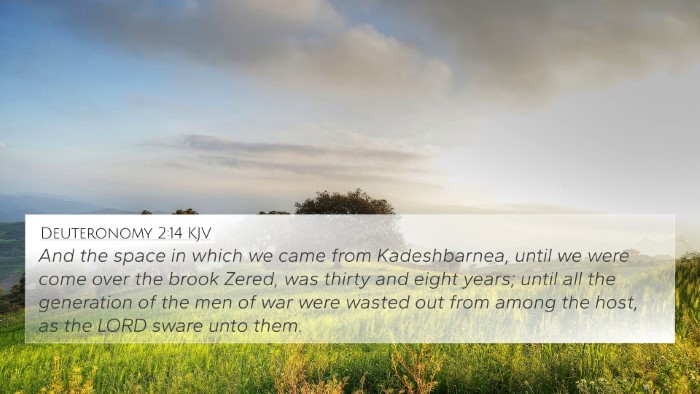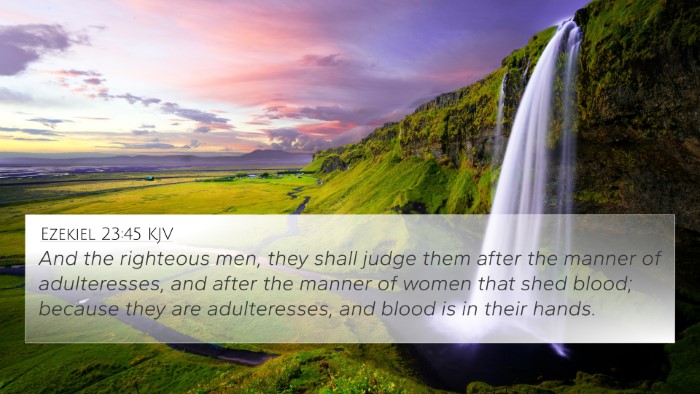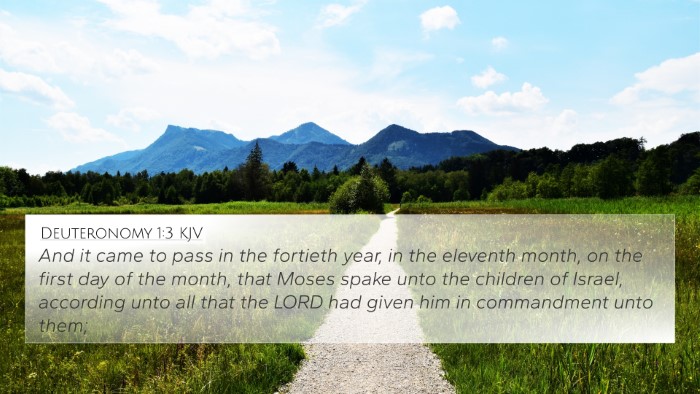Understanding Numbers 14:33
Numbers 14:33 states, "And your children shall wander in the wilderness forty years, and bear your whoredoms, until your carcasses be wasted in the wilderness." This verse encapsulates a moment of profound consequence following Israel's rebellion against God. The Israelites, having refused to enter the Promised Land due to fear, are given a harsh penalty that not only affects them but also their future generations. This commentary explores the theological implications, cross-references, and the continuity of this theme throughout the Bible.
Verse Meaning and Context
In this verse, the Israelites are held accountable for their lack of faith. The wilderness experience, lasting forty years, functions as a period of judgment and purification for the people. Both Matthew Henry and Adam Clarke emphasize that this wandering was not merely punitive but also formative for the nation as it transitioned from slavery in Egypt to eventually inheriting the Promised Land.
Key Themes
- Judgment and Consequence: The sinners faced judgment, and their descendants bore the consequences of their actions.
- Faith and Obedience: The insistence on faithfulness to God’s command is crucial, as lack of faith leads to exile from God’s promises.
- Wilderness as a Purification Process: The wilderness experience was God's means to cleanse and prepare His people.
Connections to Other Scriptures
This verse connects deeply with several other passages throughout the Bible that speak of faith, judgment, and the consequences of sin. Below are some related scriptures:
- Deuteronomy 1:35-36: God's judgment on those who doubted His promise mirrors the fate stated in Numbers 14:33.
- Psalm 95:10-11: Here, God speaks of how He loathed that generation for their disbelief, revealing the long-term effects of rebellion.
- Hebrews 3:17-19: New Testament insight on the hardening of hearts serves as a warning against repeating the mistakes of the Israelites.
- 1 Corinthians 10:5-6: Paul warns the church against the same types of unbelief experienced by the Israelites. This serves as a moral lesson for believers today.
- Matthew 23:37-39: Jesus laments over Jerusalem, drawing parallels to the consequences of rejecting God’s purpose.
- Hebrews 4:6-7: The "today" for entering God's rest echoes the urgent call for faith amidst the backdrop of disbelief.
- Exodus 32:27-28: The theme of bearing consequences resonates in Israel's earlier disobedience and its repercussions.
Thematic Bible Verse Connections
The message of Numbers 14:33 reflects key themes present throughout both the Old and New Testaments. The exploration of faith, disobedience, and the resulting consequences provides a cohesive thread linking various Biblical narratives.
Summary of Cross-Referencing Insights
Matthew Henry points out that this judgment was not arbitrary; rather, it served as a practical lesson for those who were to inherit the promise. Adam Clarke emphasizes the long spiritual implications of this period, arguing that the nation was ultimately refined through trial and tribulation.
Tools for Bible Cross-Referencing
Engaging with this verse can be enhanced through various tools for Bible cross-referencing. These include:
- Bible Concordance
- Bible Cross-Reference Guide
- Cross-Reference Bible Study Techniques
- Bible Chain References
- Comprehensive Bible Cross-Reference Materials
Conclusion
Understanding Numbers 14:33 requires careful consideration of its context, imagery, and resultant themes. This verse is a profound reminder of the importance of faithfulness to God, the gravity of rebellion, and the enduring connections across the Scriptures. By exploring these inter-Biblical dialogues and utilizing appropriate cross-referencing tools, one can gain a deeper understanding of Biblical themes and their application in a believer's life today.














